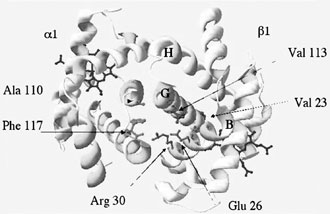


Hb CHAMPAGNE [β113(G15)Val->Leu]:
A NEW NEUTRAL VARIANT
Wajcman H1, Riou J1, Promé D2, Richelme-David S2, Galactéros F1
*Corresponding Author: Dr. Henri Wajcman, INSERM U 468, Génétique Moléculaire et Physiopathologie, Hôpital Henri Mondor, 51 Avenue du Maréchal de Lattre de Tassigny, 94010 Créteil, France; Tel: +33-1-49-81-35-78; Fax: +33-1-48-99-33-45; E-mail: Henri.Wajcman@im3.inserm.fr
page: 23
|
|
DISCUSSION
Valine b113(G15) is an internal residue located in the a1b1 interface (Fig. 3). In deoxyHb it is in molecular contact with Val 23, Glu 26, Ala 27 and Arg 30 of the same chain, and with Ala 110 and Phe 117 of the a1 chain [4]. Valine b113 is replaced by a glutamic acid in Hb New York [5], which is mildly unstable and has a slightly decreased oxygen affinity [6]. The presence of Hb Champagne could explain the mild anemia of the patient, but this hypothesis certainly needs to be strengthened by further functional studies and the report of other cases with the same substitution.
Variants such as Hb Champagne, with electrophoretically neutral substitutions, may be difficult to identify. Theoretically the change from a valine to a leucine residue should not modify the electrophoretic mobility. Six variants of this kind have been reported in the b chain, and the electrophoretic and chromatographic properties of four of these could be compared in our laboratory (Table 1). As expected, they are completely silent in cellulose acetate electrophoresis and during electrophoresis of the globin chains at acid and alkaline pHs. Slight differences in IEF, as compared to Hb A, were observed in Hbs Champagne, Nantes [b34(B16)Val®Leu] (H. Wajcman et al., personal communication), and Johnstown [b109(G11)Val®Leu]. This could be explained by a structural modification of the protein structure changing the exposure of some charged residue; a glutamic acid and an arginine are indeed in contact with this residue. Substitution of a leucine for a valine clearly increases the hydrophobicity, but according to the affected region of the Hb molecule, the results obtained by UT-PAGE, or by reversed phase HPLC differ from one case to another. To detect and characterize such variants a multi-parametric approach may be useful.
New Hb variants must always be reported to determine the degree to which they are responsible for even a mild hematological disorder that may possibly interact with another RBC abnormality [3].

Fig. 3. Localization and contacts of valine b113 at the a1b1 interface in deoxyHb.
|
|
|
|



 |
Number 27
VOL. 27 (2), 2024 |
Number 27
VOL. 27 (1), 2024 |
Number 26
Number 26 VOL. 26(2), 2023 All in one |
Number 26
VOL. 26(2), 2023 |
Number 26
VOL. 26, 2023 Supplement |
Number 26
VOL. 26(1), 2023 |
Number 25
VOL. 25(2), 2022 |
Number 25
VOL. 25 (1), 2022 |
Number 24
VOL. 24(2), 2021 |
Number 24
VOL. 24(1), 2021 |
Number 23
VOL. 23(2), 2020 |
Number 22
VOL. 22(2), 2019 |
Number 22
VOL. 22(1), 2019 |
Number 22
VOL. 22, 2019 Supplement |
Number 21
VOL. 21(2), 2018 |
Number 21
VOL. 21 (1), 2018 |
Number 21
VOL. 21, 2018 Supplement |
Number 20
VOL. 20 (2), 2017 |
Number 20
VOL. 20 (1), 2017 |
Number 19
VOL. 19 (2), 2016 |
Number 19
VOL. 19 (1), 2016 |
Number 18
VOL. 18 (2), 2015 |
Number 18
VOL. 18 (1), 2015 |
Number 17
VOL. 17 (2), 2014 |
Number 17
VOL. 17 (1), 2014 |
Number 16
VOL. 16 (2), 2013 |
Number 16
VOL. 16 (1), 2013 |
Number 15
VOL. 15 (2), 2012 |
Number 15
VOL. 15, 2012 Supplement |
Number 15
Vol. 15 (1), 2012 |
Number 14
14 - Vol. 14 (2), 2011 |
Number 14
The 9th Balkan Congress of Medical Genetics |
Number 14
14 - Vol. 14 (1), 2011 |
Number 13
Vol. 13 (2), 2010 |
Number 13
Vol.13 (1), 2010 |
Number 12
Vol.12 (2), 2009 |
Number 12
Vol.12 (1), 2009 |
Number 11
Vol.11 (2),2008 |
Number 11
Vol.11 (1),2008 |
Number 10
Vol.10 (2), 2007 |
Number 10
10 (1),2007 |
Number 9
1&2, 2006 |
Number 9
3&4, 2006 |
Number 8
1&2, 2005 |
Number 8
3&4, 2004 |
Number 7
1&2, 2004 |
Number 6
3&4, 2003 |
Number 6
1&2, 2003 |
Number 5
3&4, 2002 |
Number 5
1&2, 2002 |
Number 4
Vol.3 (4), 2000 |
Number 4
Vol.2 (4), 1999 |
Number 4
Vol.1 (4), 1998 |
Number 4
3&4, 2001 |
Number 4
1&2, 2001 |
Number 3
Vol.3 (3), 2000 |
Number 3
Vol.2 (3), 1999 |
Number 3
Vol.1 (3), 1998 |
Number 2
Vol.3(2), 2000 |
Number 2
Vol.1 (2), 1998 |
Number 2
Vol.2 (2), 1999 |
Number 1
Vol.3 (1), 2000 |
Number 1
Vol.2 (1), 1999 |
Number 1
Vol.1 (1), 1998 |
|
|

